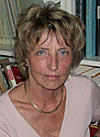EGU Hans Oeschger Medallist 2010
|
Françoise Gasse for her contribution to the reconstruction of climate variability during the Holocene from continental archives and to a better understanding of climate mechanisms involved during this period. |
Françoise Gasse is a paleoclimatologist and palehydrologist who has dedicated most of her scientific research to the study of lacustrine sediments from ancient lakes from Africa and Asia. One of her key contribution has been to develop the use of diatom distribution to infer how lake properties such as depth and salinity have evolved through time. And from them, to reconstruct hydrological and climatic parameters in the areas studied. To obtain a comprehensive and quantitative picture of the lake's environment, she has also used other information such as that obtained from pollen distribution and from changes in oxygen and carbon isotopes combined with modelling approaches. She started her work, in the 1970s, on East African lakes and then extended her interest to other parts of Africa (Niger, Madagascar, Malawi...) and to Asia (Caspian sea, Tibetan Plateau, …). Most of her numerous and well cited articles deal with the late Quaternary, including the late glacial and the last climatic transition. Her focus is also on the more recent period, the Holocene and the last millennia, with important contributions showing the existence of rapid events as seen from the hydrological cycle, during those periods previously thought to be stable, with major dry spells around 8000 and 4000 years ago.
About 10 years ago, Gasse, a Director of Research at CNRS, moved from Orsay (at the Laboratoire d'Hydrologie Isotopique near Paris) to CEREGE (Centre Européen de Recherche et d'Enseignement en Géosciences de l'Environnement) in Aix-en-Provence. She is very active both at national and international (as member of PAGES/IGBP) levels. In 2005, she was awarded the Vega Medal in Gold by the Swedish Society for Anthropology and Geography, being the first female scientist to receive this prestigious medal.

